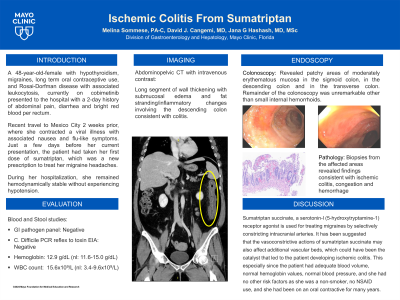Tuesday Poster Session
Category: Colon
P3718 - Ischemic Colitis From Sumatriptan
Tuesday, October 29, 2024
10:30 AM - 4:00 PM ET
Location: Exhibit Hall E

Has Audio

Melina V. Sommese, PA-C
Mayo Clinic
Jacksonville, FL
Presenting Author(s)
Melina Sommese, PA-C, David J. Cangemi, MD, Jana G. Hashash, MD, MSc
Mayo Clinic, Jacksonville, FL
Introduction: Ischemic colitis is a condition that often occurs in an older patient population and it is one of the more common forms of gastrointestinal ischemia.
Case Description/Methods: A 48-year-old-female with hypothyroidism, migraines, long term oral contraceptive use, and Rosai-Dorfman disease with associated leukocytosis, currently on cobimetinib presented to the hospital with a 2 day history of abdominal pain, diarrhea and bright red blood per rectum. The patient had recently travelled to Mexico City 2 weeks prior, where she contracted a viral illness with associated nausea and flu like symptoms. Just a few days before her current presentation, the patient had taken her first dose of sumatriptan, which was a new prescription to treat her migraine headaches. During her hospitalization, she had remained hemodynamically stable without experiencing hypotension. Hemoglobin was 12.9 g/dL (normal: 11.6-15.0 g/dL) and the white blood cell count was 15.6x109/L (normal: 3.4-9.6x109/L). An abdominopelvic computed tomography scan with intravenous contrast was ordered which showed a long segment of wall thickening with submucosal edema and fat stranding/inflammatory changes involving the descending colon consistent with colitis. Differential considerations were for infectious, inflammatory or ischemic etiologies. A GI pathogen panel, ova and parasites as well as a C. difficile PCR were all negative for infection. A colonoscopy revealed patchy areas of moderately erythematous mucosa in the sigmoid colon, in the descending colon and in the transverse colon. The remainder of the colonoscopy was essentially unremarkable other than small internal hemorrhoids. Biopsies from the affected areas were obtained and revealed findings consistent with ischemic colitis as well as congestion and hemorrhage.
Discussion: Sumatriptan succinate, a serotonin-l (5-hydroxytryptamine-1) receptor agonist is used for treating migraines by selectively constricting intracranial arteries. However, it has been suggested that the vasoconstrictive actions of sumatriptan succinate may also affect additional vascular beds, which could have been the catalyst that lead to the patient developing ischemic colitis. This is especially since the patient had adequate blood volume, normal hemoglobin values, normal blood pressure, and had no risk factors as she was a non-smoker, had no NSAID use, and she had been on oral contractive for many years.

Disclosures:
Melina Sommese, PA-C, David J. Cangemi, MD, Jana G. Hashash, MD, MSc. P3718 - Ischemic Colitis From Sumatriptan, ACG 2024 Annual Scientific Meeting Abstracts. Philadelphia, PA: American College of Gastroenterology.
Mayo Clinic, Jacksonville, FL
Introduction: Ischemic colitis is a condition that often occurs in an older patient population and it is one of the more common forms of gastrointestinal ischemia.
Case Description/Methods: A 48-year-old-female with hypothyroidism, migraines, long term oral contraceptive use, and Rosai-Dorfman disease with associated leukocytosis, currently on cobimetinib presented to the hospital with a 2 day history of abdominal pain, diarrhea and bright red blood per rectum. The patient had recently travelled to Mexico City 2 weeks prior, where she contracted a viral illness with associated nausea and flu like symptoms. Just a few days before her current presentation, the patient had taken her first dose of sumatriptan, which was a new prescription to treat her migraine headaches. During her hospitalization, she had remained hemodynamically stable without experiencing hypotension. Hemoglobin was 12.9 g/dL (normal: 11.6-15.0 g/dL) and the white blood cell count was 15.6x109/L (normal: 3.4-9.6x109/L). An abdominopelvic computed tomography scan with intravenous contrast was ordered which showed a long segment of wall thickening with submucosal edema and fat stranding/inflammatory changes involving the descending colon consistent with colitis. Differential considerations were for infectious, inflammatory or ischemic etiologies. A GI pathogen panel, ova and parasites as well as a C. difficile PCR were all negative for infection. A colonoscopy revealed patchy areas of moderately erythematous mucosa in the sigmoid colon, in the descending colon and in the transverse colon. The remainder of the colonoscopy was essentially unremarkable other than small internal hemorrhoids. Biopsies from the affected areas were obtained and revealed findings consistent with ischemic colitis as well as congestion and hemorrhage.
Discussion: Sumatriptan succinate, a serotonin-l (5-hydroxytryptamine-1) receptor agonist is used for treating migraines by selectively constricting intracranial arteries. However, it has been suggested that the vasoconstrictive actions of sumatriptan succinate may also affect additional vascular beds, which could have been the catalyst that lead to the patient developing ischemic colitis. This is especially since the patient had adequate blood volume, normal hemoglobin values, normal blood pressure, and had no risk factors as she was a non-smoker, had no NSAID use, and she had been on oral contractive for many years.

Figure: Figure 1. A. Computed tomography view with the inflammatory changes in the descending colon, B. Colonoscopy images, and C. Histology images.
Disclosures:
Melina Sommese indicated no relevant financial relationships.
David Cangemi indicated no relevant financial relationships.
Jana Hashash: Bristol Myers Squibb – Consultant.
Melina Sommese, PA-C, David J. Cangemi, MD, Jana G. Hashash, MD, MSc. P3718 - Ischemic Colitis From Sumatriptan, ACG 2024 Annual Scientific Meeting Abstracts. Philadelphia, PA: American College of Gastroenterology.
